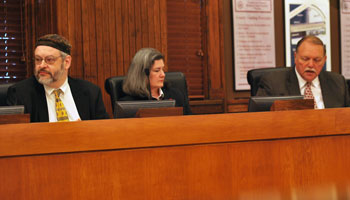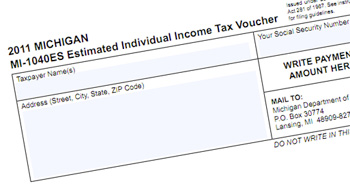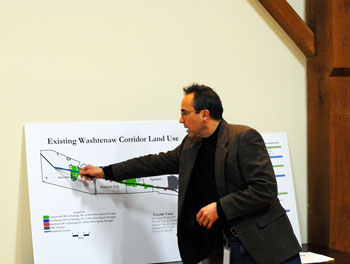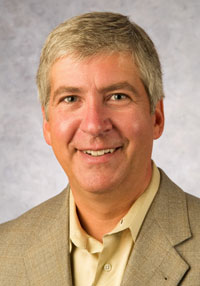At a clarity hearing held on April 29, 2011, the Washtenaw County board of election commissioners found that the proposed ballot language in a petition asking for the recall of Gov. Rick Snyder was sufficiently clear. Snyder, a Republican, was elected Nov. 2, 2010.

Washtenaw County board of election commissioners, left to right: Larry Kestenbaum, Catherine McClary, Donald Shelton. (Photos by the writer.)
Washtenaw County’s election board held the hearing because the petition must be filed in the county where the subject of the recall lives – Snyder is an Ann Arbor area resident.
Around 20 people attended the hearing, many of whom wore yellow buttons with language indicating support for the recall. Four people addressed the board during the public participation part of the agenda, including Snyder’s legal counsel, John Pirich, of the law firm Honigman Miller Schwartz and Cohn. Snyder – who is giving the commencement speech at the April 30 University of Michigan graduation ceremonies – did not attend Friday’s hearing.
The board of election commissioners consists of (chair) Donald E. Shelton, chief judge of the Washtenaw County Trial Court; (secretary) Larry Kestenbaum, county clerk; and (member) Catherine McClary, county treasurer. Kestenbaum and McClary were elected clerk and treasurer as Democrats. Shelton was elected judge on a non-partisan ballot, but in the past has run for office as a Democrat.
The vote on the clarity of the language was 2-1. McClary’s was the dissenting vote.
The language that the board found to be sufficiently clear was as follows: “Richard D. Snyder has requested from the legislature, approved and signed various laws that take authority and funds from local governments and school districts and vest them with the state. He has obtained for himself, through his appointed Emergency Financial Managers, the power to invalidate legal and binding contracts entered into by properly elected local authorities. He has sought tax increases upon retirees and lower income families, but instead of addressing the deficit, he has sought large new tax cuts for corporations and businesses.” [.pdf of proposed recall ballot language]
Under Michigan’s state election law, the finding at a clarity hearing can be appealed to the Circuit Court within 10 days of the finding by the petitioner or the officer. As of late Friday, April 29, Snyder had not made a decision whether to appeal.
Snyder’s office issued this statement: “The Governor remains fully committed to making the tough fiscal and policy decisions that have been put off for far too long. He knew full well that it wasn’t going to be easy. His budget and tax plan was a comprehensive approach to hit the ‘reset’ button and tackle the state’s structural deficit once and for all, grow Michigan’s economy for more and better jobs, ensure core and safety net services, and build a strong foundation for the future.”
After public participation, the deliberations by the board of election commissioners on the clarity of the language lasted about 10 minutes, with the entire session lasting around 20 minutes. [Full Story]










